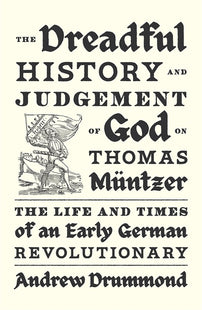A leaky powder-keg
Late fifteenth century Germany into which the radical millenarian preacher Thomas Müntzer was born was a time of social and political unrest: the perfect time to be questioning the basic tenets of the Papal Church.

Thomas Müntzer was born – as far as can be determined – in 1489. And having brought him into the world, let us immediately abandon him there for the duration of his childhood, for we must make a brief attempt to comprehend the world into which he was born.
Not long after Müntzer’s birth, a writer later dubbed – a little arbitrarily – the ‘Revolutionary of the Upper Rhine’ set out his predictions for the coming decade:
The Lord will come after seven thousand years and will pass a mighty judgement over Man and punish us for our evil . . . The peasant will rise up against his masters and even his spiritual leaders . . . and the common man will cast down the high and mighty.
The Book of One Hundred Chapters and Forty Statutes of this ‘Revolutionary’ is a curious one, full of wild predictions, astrological terminology and warnings of the imminent end of the world; for the end was indeed nigh, and could be expected somewhere around 1500 (which is announced as the year marking the end of the mystical seventh ‘Chiliade’ or millennium). Although the author was in fact an Austrian nobleman – whose aim was to promote a reformed Empire with governing structures which would improve the lot of the peasantry, while keeping them in their place: in short, a reformist, not a revolutionary – his book was by no means an outlier when it came to the popular thought of the fifteenth century.
A few decades earlier, in 1440, another work entitled The Reformation of the Emperor Sigismund had appeared, in which similar predictions were made: ‘The time is now come when we must awake’, its author wrote, ‘stand up, acknowledge God, and prepare the way which is that of God and righteousness . . . for you will clear the path for He who will come next.’ The book clearly struck a chord with the intellectuals of the time, being reprinted in 1476, and several times more in the first two decades of the sixteenth century. Even as late as 1521, Martin Luther and his colleagues were themselves not averse to imagining that something rather Apocalyptical was about to happen.
For many intellectuals, then, there was something important about the numerically significant year of 1500. Just as in the late twentieth century, when people looked to the year 2000 as some kind of watershed, albeit with a fair degree of pessimism (quite unjustifiably as it turned out: the Apocalypse did not come until a little afterwards), many late fifteenth-century Europeans attached their hopes and fears to the turning of the century.
Millenarianism is the expectation of the Second Coming of Jesus Christ, and the consequent establishment of a ‘Kingdom of God’; it had been a feature of the preceding centuries, and by the late fifteenth century it was breaking forth once more in the German-speaking territories. Discontent was also stalking the lands in more potent form in the guise of rural and urban revolt.
In 1476, for example, there was a powerful but short-lived revolt by thousands of peasants in the Tauber valley in Franconia, led by a man known as the ‘Drummer of Niklashausen’. The revolt had shown that resentment in matters social and economic among the poor was at boiling-point, likely to spill over into popular revolt at any moment. This was to be the first in a series of such sporadic and localised uprisings – generically grouped together as the ‘Peasant’s Shoe’ (Bundschuh) movement, from the symbol they adopted on their banners – that would culminate in the great German Peasants’ War of 1525.
Nor was it just the lower classes who revolted: the Imperial aristocracy, too, felt downtrodden, and were in constant conflict with the territorial princes as their traditional power was slowly eroded by land-purchase and political manoeuvring. The Holy Roman Empire, which had held sway across much of central Europe since the tenth century, was gradually seeing its power slip away into the hands of its electoral college, the local principalities and territories.
The knights of the Empire clung desperately to their ever-diminishing estates and privileges, but theirs was a struggle against the tide. By contrast, in the flourishing towns, the burgher classes, the more well-to-do artisans and the intellectuals were beginning to scratch the itch of independence, seeking to sever feudal relationships and cut loose from the Church in Rome. Some towns and cities had effectively become independent political and economic units, having only nominal feudal lords; they were doing quite nicely on their own, despite an economic downturn towards the end of the fifteenth century.
In the religious sphere, matters were no calmer. Seventy years before Müntzer’s birth, the Hussite reforms in Bohemia had inspired an entire nation to rise up and challenge the might of the Papal Church, and this reform movement had infected parts of Germany over several decades. So now the Bohemians and Germans knew that it was at least possible to question the spiritual authority. Having taken that step, they found the courage to ask more, and more penetrating, questions about the role and status of the Church – any Church – in the life of a nation.
The late fifteenth century in central Germany, then, was something of a leaky powder-keg. There was unrest in towns and villages, and there were people openly questioning the basic tenets of the Papal Church. The combination of social and political unrest with the intellectual and religious debate was to provide the fuse which lit the powder.
— An edited excerpt from The Dreadful History and Judgement of God on Thomas Müntzer: The Life and Times of an Early German Revolutionary by Andrew Drummond.
[book-strip index="1" style="buy"]

